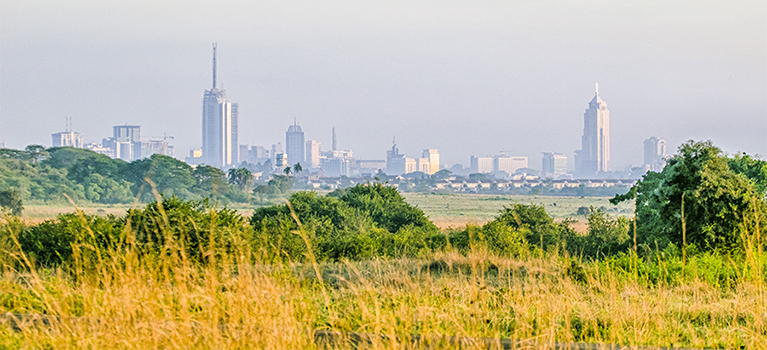We use cookies to give you the best possible online experience. See our cookie policy for more information on how we use cookies and how you can manage them. If you continue to use this website, you are consenting to our policy and for your web browser to receive cookies from our website.

An expat's guide to Kenya
Straddling the equator and famed for its majestic wildlife, beautiful countryside and vibrant culture, Kenya is also known as the cradle of humanity. Anthropological excavations in 1984 revealed the earliest upright homo erectus, in other words fossilised bones of our earliest human relations near Lake Turkana, dating back a mere 1.8 million years.
Modern Kenya is a forward-looking country, with many investors, including businessmen in Dubai, actively seeking investment opportunities within the republic. The country’s economy is growing and there are numerous opportunities for employment in the country. With Mombasa on the coast, and Nairobi, the capital, in the south of the country, and hundreds of smaller towns and settlements throughout Kenya, this ancient land has countless opportunities for all. Kenya’s population stands at more than 50,500,000, making it the 28th largest population in the world (March 2018).
Forty tribes make up this population as well as large numbers of expats. Kenya was ruled by the British until 1963, and most Kenyans use English or Swahili in their business life. If you live in Nairobi, you’ll hear English spoken across the city. Figures from 2017 show that only 26.5% of the population live in urban areas. And, most of Kenya’s population live in the West by Lake Victoria, in Nairobi and along the shores of the Indian Ocean.
The public health care is patchy, both in the quality of the hospitals and clinics, and the number of health care professionals, but there are plenty of private hospitals and clinics. Most expats send their children to one of Kenya’s private schools to ensure a high standard of education.
Kenya’s scenery is stunning, with Lake Victoria to the west and the Indian Ocean to the east and numerous wildlife reservations and stunning wild animals that can be spotted throughout the vast Kenyan wilderness. An increase in the use of pesticides has polluted rivers and parts of Lake Victoria — in 2014, just under 49% of the country’s land was reported to be agricultural.
In common with many countries across the African continent, Kenya does have its security problems, Al Shabaab has carried out terrorist attacks in Nairobi in recent years. Many expats are still choosing to relocate here to take advantage of Kenya’s economic opportunities. According to the Global Religious Futures project, the population of Kenya in 2020 is predicted to be:
- 84.5% Christian
- 10.5% Muslim
- 5% other religions, including local indigenous beliefs.
Thanks to Kenya’s geographical position, it doesn’t have seasonal variations. January and February, September and October are the hottest months, with temperatures reaching the low 30s, but early mornings can be cool throughout the country. Mombasa, on the coast, has a tropical climate. The rains fall in April and November. Kenya lies on a geological fault line, and the last major earthquake took place in 2007.
Kenya has the fastest broadband speeds in Africa, and the government has embraced the digital revolution. While living here, take some time to savour the Kenyan countryside as well as the hustle and bustle of its major cities, after all you’ll simply be walking in the footsteps of your ancestors.
Health and health care in Kenya
Find out what the quality of health care is like in Kenya and how easy it is to access care whether you’re in an urban or rural area.
Finding work in Kenya
Before you consider making the move to Kenya, read up on the economy, health of the employment market and how to find work in the country.
Business etiquette in Kenya
Understanding how to navigate a new culture and business environment could help you make a good impression and support day-to-day interactions.
Visas for relocating to Kenya
Before you start your new life in Kenya, you need to read up on visas, tax codes and residency permits. Find out all you need to know here.
Kenyan culture and lifestyle
There’s no doubt Kenya is a country brimming with colourful traditions. Find out more about the culture and lifestyle you’ll experience if you make the move.
Staying safe in Kenya
Kenya has certain laws that you may not be used to, there are also crime risks that you should be aware of before arriving.
Cost of living in Kenya
It’s useful to get a good understanding of the costs of daily living in Kenya before you make the move.
Finding a home in Kenya
Kenya has some very strict property rules for expats. Find out how to navigate the system, whether you’re planning to buy or rent in the country.
Kenya: Where to live
Nairobi and Mombasa are the most popular cities for expats but don’t disregard the other options.
Getting around Kenya
Wherever you’re planning to live, make sure your familiar with the transport options available and their associated costs.
Sources
http://www.bbc.co.uk/news/world-africa-13681341
https://www.museon-omniversum.nl/en/knowledgebaseitem/the-story-of-man
https://www.businessdailyafrica.com/news/Dubai-business-delegation-kenya/539546-4295844-dyv7s3z/index.html
http://techcabal.com/2017/08/28/kenya-broadbant-fast/
https://data.worldbank.org/indicator/SP.POP.TOTL
https://www.expertafrica.com/kenya/weather-and-climate
https://www.cia.gov/library/publications/the-world-factbook/geos/print_ke.html
http://www.globalreligiousfutures.org/countries/kenya#/?affiliations_religion_id=0&affiliations_year=2020®ion_name=All%20Countries&restrictions_year=2015
https://tradingeconomics.com/kenya/agricultural-land-percent-of-land-area-wb-data.html
http://www.worldometers.info/world-population/population-by-country/




